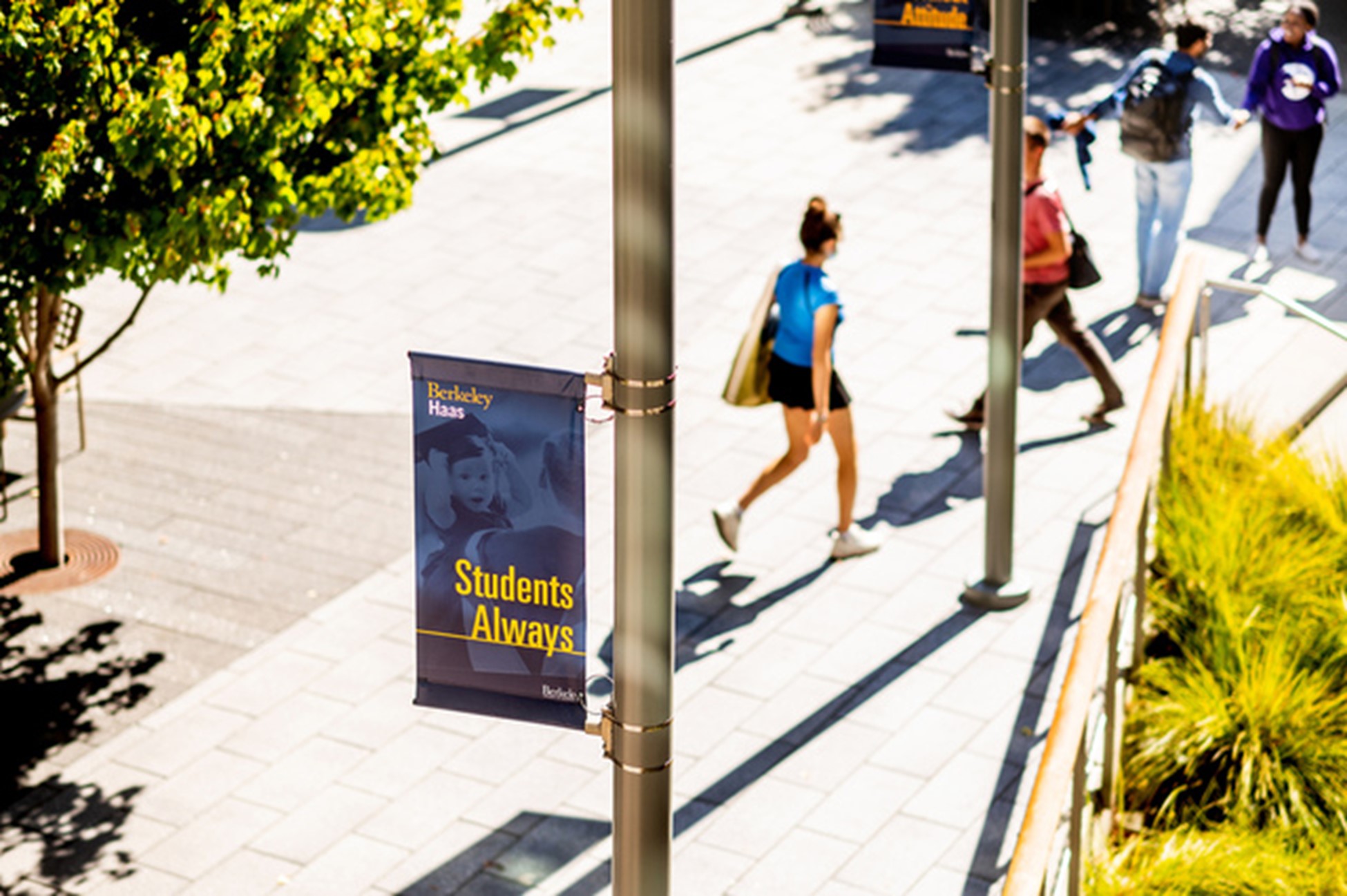
What defines excellence at a University? What creates quality in a higher education institution? Even more, what compels prospective students and eager parents to see true value in an educational experience?
Growing up, I started to gain awareness about the college scene. I understood that the Haas School of Business was one of the “best” in its arena. Yet, I often wondered, why this was the case? More than that, what was behind Haas’ high ranking and how did it translate to providing students with a stellar education that enabled them to grow into future leaders?
My research led me to discover the Haas School’s Four Defining Leadership Principles:
- Question the Status Quo
- Confidence Without Attitude
- Students Always
- Beyond Yourself
These pillars are what ultimately convinced me to choose Haas in full faith. They are the heart of what makes Haas excellent. These pillars are also what have shaped my Haas experience, where I am a sophomore in the Global Management Program. What empowers me most, however, is that these Four Principles are not simply preached for effect. Rather, they are genuinely practiced by the Haas community and embedded through our student journey. From a student perspective, I will discuss how these Four Defining Leadership Principles are manifested at Haas:

Ayushi Bhardwaj
1. Question the Status Quo
Question the Status Quo means observing the world with curiosity, as well as identifying what works well and what doesn’t – and why. Even more, we ask, What can be changed for the better? This principle is rooted in critical thinking, encouraging students to proactively investigate their world and question their assumptions.
Often, whether it’s a Finance or International Business class, understanding and analyzing the news is a critical component of our agenda. For example, if a current event, like high inflation rates worldwide, causes ripples in the economy, our professors prompt us to discuss its facets. In class, we have explored the functionality of supply chains and resource management, or how leaders of countries can react to hedge their economies. We also analyze whether leaders made the right decisions or took the optimal steps, usually looking at case studies. In PR Communications, for example, we have discussed the intricacies of Tesla’s brand presence and how its future projections will pan out.
On a larger scale, the Haas School promotes the idea of Questioning the Status Quo through its emphasis on innovation. Numerous student startup resources encourage vertical growth and push students to create fresh concepts, not passively settling for what is. In fact, Lime, a scooter startup, was founded by Haas Masters graduates. Gravity Platforms Inc. was also launched by two Haas undergraduates, and aims to provide a “healthier” social media and entertainment app. In essence, our Haas experience shows us that there can be better – and we must do better. That means we must always be asking ourselves, ‘What is working and what isn’t working?’ Essentially, the Question the Status Quo pillar empowers Haas students to look at the world with a keen, critical eye, not take the world and its conventions as a given.
2. Confidence Without Attitude
Confidence Without Attitude demands that students believe in themselves and carry themselves with poise – but not become showy or overbearing. A more subtle principle, Confidence Without Attitude, defines the energy of Haas Humans. While current students are still developing at Haas, alumni and professors serve as incredible models. Haas often holds alumni events, including panels or Speaker Series, where school alumni share personal experiences about their career trajectory or their own companies. In particular, I was able to hear a Haas Alumni, who is now a partner at Goldman Sachs’ London office, speak about his career lessons. Despite his impressive role, he had a coffee in hand, moving around the room to engage students, eagerly answering all sorts of questions from us.
What stands out is how alumni describe both successes and raw backstories with honesty about their journey. The tone is not one of overflowing pride or arrogance for being so accomplished. Rather, it is confident, self-assured, and uniquely filled with excitement for the process of business and innovation itself. They seem devoted to the idea of growth. Such Haas Alumni speak volumes about the long-lasting legacy of Haas. The school has birthed alumni who have made a positive impact globally, yet are composedly tasteful and devoid of attitude.
The same goes for professors who teach with a calm yet bold touch, eager to answer questions and never overpowering students even when challenged. For example, Professor Dana Carney, who has her own lab, focused on the interconnection between nonverbal communication, racial discrimination, power status, and inequality. She is also very giving and open. Carney recently interviewed with the Haas Undergraduate Blog. Her philosophy: “There is nothing that makes me happier than opening the door for someone.”

Haas courtyard picture (Noah Berger, Haas School of Business, 2018)
3. Students Always
Students Always frames the learning culture at Haas, compelling students to crave understanding more. Curiosity is presented as a way of life, as we approach the world with intrigue and an eagerness to understand more than the minimum. Students ask questions that create connections across subjects and demonstrate a personal investment in the content.
At Haas, professors share world-based examples and explain the background behind concepts, proving learning to be a wholehearted process. For example, when teaching International Business, Professor Dan Himelstein integrates his own experiences into his lessons. In one case, he shared how, when he did business in countries like Japan, he noticed nuanced culture differences. Through this, he teaches students that global variation should be studied because cultural awareness is critical to respectful business practices overseas. To be successful, you must always be a student who is always observing, interpreting, and adapting.
Students who are trying to get into Haas as second-years often feel pressure to do well in class for a competitive GPA. In reality, at Haas, there is more of an authentic drive to genuinely learn. In fact, discussion sections often accompany main class lectures, allowing for a smaller group of students to be taught by, many times, an MBA student. Here, students review class content with an in-depth viewpoint. Students can comfortably and passionately engage with ideas. In UGBA 10, Principles of Business, we had a weekly discussion section. The MBA leader used videos to supplement core concepts, and encouraged students to participate in various activities. These included group work to create, for example, exemplary brand statements or even individual activities to determine personality type. These exercises weren’t designed to bump up our GPA. Instead, they were a means to practice what we learned and discover more about ourselves. The grade was secondary to the takeaways.
4. Beyond Yourself
The heart of Haas – its core philosophy – is to go ‘Beyond’ and contribute to society. A large promoter of philanthropy and the empowerment of underprivileged groups, Haas is a strong advocate for kindness. In fact, the “Haas Fund” supports underprivileged students who need assistance financing their education or obtaining resources. This is universal across the staff and student body, with classes integrating ethics and the human touch of business. Students have a notable and spirited endeavor to give back to society, beyond themselves, and solve dire problems of the century. We want to uplift populations, and act with compassion. There are even Haas clubs devoted to social impact like The Berkeley Group, which hold high standards of work, to provide pro bono consulting services. Empathy is at the Heart of Haas.
Bio
Ayushi Bhardwaj is a sophomore at the University of California, Berkeley (fondly known as “Cal”), where she is studying Business Administration with a Global Concentration, along with Cognitive Science. She is interested in consumer psychology and cognitive learning theory, and aims to work in startup consulting on an international scale. Ayushi dreams to fuse empathy and strategy in her life trajectory, uplifting the world with intentionality.
You can often find her editing articles for the Haas Undergraduate Blog, jotting down the random entrepreneurial ideas in her mind, listening to podcasts about ethics, snacking on quirky Trader Joe’s delicacies, or scrolling through way too many photos of her dog, Joey.











Questions about this article? Email us or leave a comment below.